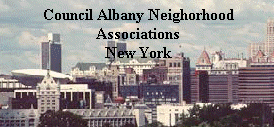
|
|
|
| Finding common ground for reform
Albany-- Neighborhood groups work toward permanent cures for many long-standing city problems
By ERIN
DUGGAN, Staff writer
The topics aren't new -- crime, vacant buildings and quality-of-life issues -- but Saturday's six-hour program was supposed to be different from previous gatherings. Organizers of the third annual Neighborhood Works program were hoping to find common ground within 27 neighborhood groups, pinpoint their top priorities and form specialized committees that will continue to work throughout the year to make goals identified Saturday a reality. "We want to come up with realistic action plans," said Gene Solan, chairman of the Neighborhood Resource Center, which sponsored the event with the Council of Albany Neighborhood Associations. In previous years, the seminars were more like lectures, where neighbors learned about city issues, but didn't lead the discussion. This year, neighbors were supposed to set the agendas by voting on which issues were most important to them. It wasn't an easy task. With neighborhoods as different as Pine Hills and Arbor Hill, finding a consensus was a challenge. For example, ideas for improving public safety in Albany ranged from legalizing marijuana to creating better after-school programs. Alice Raab, a 10-year Park South resident, told the group working on public safety matters that she's seen her neighborhood decline to where she's afraid to spend time in her front yard. "It's all accepted," she said about the crime and decline in her neighborhood's appearance. Because of the format of the seminars, Public Safety Commissioner John Nielsen, who was sitting across the room from Raab, couldn't respond to her claim that crime isn't taken seriously in her neighborhood because it's a poor area. To keep seminars on a tight schedule, law school student moderators quashed discussion. City employees familiar with city problems weren't asked many questions, or even encouraged to speak or answer complaints. Solan said the diversity of suggestions, and the need for a long-range plan, prompted a change in the meeting's format. Although occasionally frustrating for people who felt they weren't being heard or that ideas weren't developed, Solan said he thinks having several committees dedicated to the different areas of life in Albany will be effective in the long run. The groups are expected to meet again by mid-January and will work with city officials to put into action the ideas brought forward Saturday. |